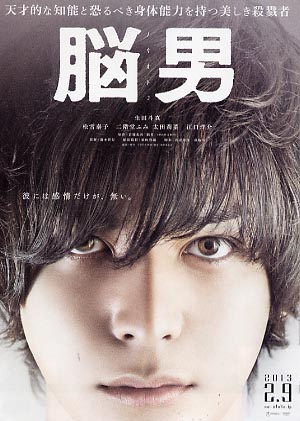“Brain Man” – Film Review from Australia’s Japanese Film Festival
Australia’s 17th Japanese Film Festival is soon embarking on its last city tour in Melbourne, the capital of the southern state of Victoria, after being shown around Australia in the first ever national film festival administered by the Japan Foundation. Eden Law (Fukushima-ken ALT 2010-2011, current JETAA NSW committee member) got to see some of what’s on offer during its recent run in Sydney. This one’s for you, Melbournites! Don’t say we don’t do anything for you south of the border.

Doumo arigatou Mr Roboto
At times graphically brutal and sadistic, “Brain Man” moves at a brisk pace, frequently keeping the audience off-balance with unsettling scenes and stylistic ideas that are reminiscent of other films in the genre. An adaptation of the novel “No Otoko” by Urio Shudo, the novel itself won the 2000 Edogawa Rampo Award for newcomers to crime fiction. In it, a series of sadistic murders and explosions pressures the police lead by Detective Chaya (Yosuke Eguchi, who must be channelling every crusty, grouchy detective character ever to exist in film) to find the culprits responsible, and soon enough Ichiro (Toma Ikuta) is apprehended as the prime suspect. However, things are rather decidedly odd about Ichiro, who is more like a robot than a human, going like clockwork to… go, unable to feel pain or emotion. Although in peak physical condition (via an establishing shot as the camera lingers over Toma’s skinny yet hard-bodied torso, which is itself inhumanly bereft of fat), he is clearly a special psychiatric case, which is where Dr Washiya (Yasuko Matsuyuki), a brilliant psychiatrist, comes in to help with police investigation. Although like other characters in the film, she herself carries a trauma, that fuels her determination to investigate and uncover the truth about Ichiro, and ultimately the case.
This film calls for a certain suspension of disbelief – probably more than usual, with the number of implausibilities it has. This is not a film that is completely grounded in reality, even given the premise of a serial-bomber-Saw-wannabe and a man-bot. However, that’s not to say it’s done badly. Director Tomoyuki Takimoto excels at creating a tense, unsettling atmosphere, typically using lots of dark cold colours that’s grim and claustrophobic, even in the day scenes. There are unexpected shocks punctuating the film at a brisk pace, creating a sense of dangerous unpredictability for the characters. Takimoto doesn’t shy away from being graphic either, what with body parts being ripped, stabbed, shredded or sliced merrily in some form or another, in sadistically creative ways. Some of the characters and baddies are suitably over the top (especially Fumi Nikaido and Rina Ohta as Noriko and Yuria, in deliciously scenery-chewing performances), though are a little obscure in their motivation. But whatever man, they’re totes cray-cray – who can understand why they do the things they do.
But that sort of unreality element can work against it, especially when the film, in the form of Dr Washiya, seems to be exploring more serious and unexpectedly philosophical issues: can a person be rehabilitated, or their basic nature changed? In the beginning of the film, Dr Washiya advocates a new form of “narrative” therapy to habilitate hardened criminals, contrary to the accepted methods of the establishment. It’s a theme that surfaces once in a while throughout the film, although largely overwhelmed by the more exciting and visceral violence and terror. But during those moments, Matsuyuki (as the doctor) does really well in giving her character the right mix of toughness and vulnerability, and her interaction with a “cured” patient, brings a totally different kind of disturbing creepiness thanks in no small part to Shota Sometani who plays Shimura, the patient in question. But these differences seem out of place in a film that’s usually more thrills and spills, in a world where a grizzled no-nonsense detective has long hair and the living coin-operated boy somehow has access to a great hair stylist and chic clothes.
However, as mentioned, “Brain Man” is still done well and is highly enjoyable to watch, especially if you’re a fan of the thriller/crime/mystery genre. As Ichiro, Toma Ikuta’s highly restrained acting, communicating only through subtle body language and stares, is quite absorbing. And “Brain Man” manages to deliver right to the end, as a final emotional shock is revealed.
PS: Bonus points for the ending credit song: “21st Century Schizoid Man” by King Crimson!
Brain Man (No Otoko) by Tomoyuki Takimoto, released in Japan February 9 2013, starring Toma Ikuta, Yasuko Matsuyuki, Yosuke Iguchi, Fumi Nikaido and Rina Ohta.


Comments are closed.